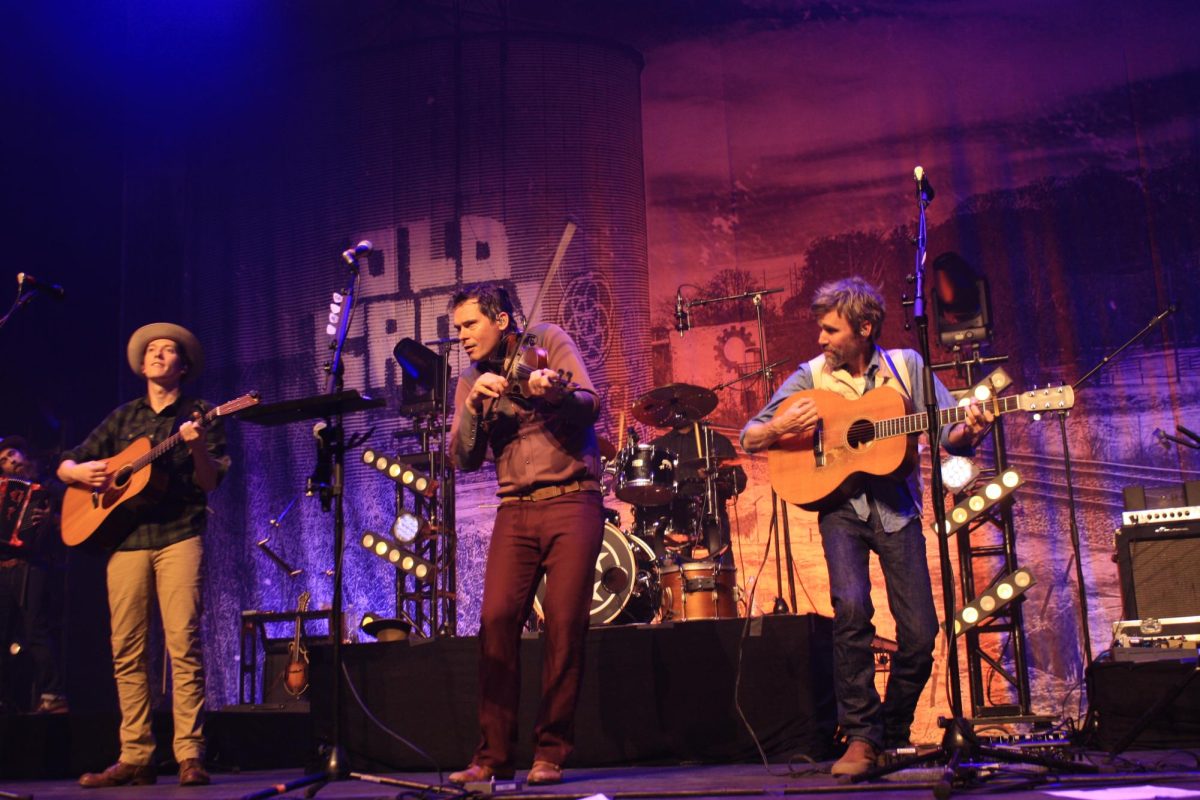With a chorus of quick fiddles and plucky guitars, Old Crow Medicine Show came out with a country bang. They opened with “Tell It To Me,” a piece with lyrics (sang with a twang, of course) like “cocaine’s gonna kill my honey dead.” Ketch Secor, the lead vocalist, played so furiously on his fiddle that the frayed strings of his bow swung around his head and his hair became matted with sweat. Secor and Mason Via—guitarist and newest member of the band—took turns dancing around the stage, kicking up their legs in an impressive riff on the can-can. The hit is from their newest album and namesake for their current 25th anniversary tour, Jubilee, which they proudly announced has been nominated for folk album of the year.
The old-time string band consists of many multi-talented musicians who seamlessly switched between instruments, sometimes mid-song. Cory Younts started stage left behind a wooden piano but would occasionally step up to the microphone. Mike Harris claimed stage right with his imposing slide guitar. Morgan Jahnig occasionally limped his giant upright bass around the stage but mostly stayed put. PJ George peeked out from stage left, one second with an accordion, the next with a banjo or mandolin. Dante’ Pope, originally from the west side of Chicago, switched from the drums to a silver chest washboard. The band was originally discovered busking—playing on the street—in North Carolina and, 25 years later, they maintain that high energy and sense of community on stage. With the seven musicians constantly bouncing around and fighting for space around the communal microphones, the stage buzzed with energy.
The Salt Shed was full of middle-aged, die-hard folk fans, many of whom had traveled from far outside Chicago to attend. While I’m not really one to socialize at concerts, the crowd was so friendly and easy-going I found myself in three or four conversations throughout the night. While chatting, I learned that the opener, Willie Watson, used to be a member of the band, and collaborated with them on their newest album. Watson may have been the most engaging and energetic opener I’ve ever seen and was clearly a seasoned professional. Opening with Sara Watkins on what Watson called the “hot violin” and Ben Gould on the upright bass, the trio had the crowd hopping and singing along to old work songs.
When Watson, beat-up guitar in hand, popped back on stage to reunite with Old Crow during their set, it was clear that the band was moving into their signature tracks. Secor whipped a harmonica out of his sleeve, and all immediately jumped into “Down Home Girl.” With complex combinations of harmonica, strings and percussion, and Watson’s twangy vocals, “Down Home Girl” is one of their best songs. It also includes some of my favorite lyrics of all time: “Every time I kiss you girl,/ It tastes like pork and beans.”
The band clustered together around the microphones at center stage and a calm, steady fiddle melody introduced their top song, “Wagon Wheel.” The chorus was originally recorded by Bob Dylan in 1973 and Secor wrote the verses in the early 2000s. The song has since been covered numerous times with some covers topping the charts, but Old Crow’s take on the classic country piece is probably the most musically complex of any version, and unlike the covers, it doesn’t rely on upbeat instrumentals to suck in the audience. The crowd of men on stage all contributed to the soul of the piece; their instruments complemented each other while their voices reached out to the crowd in a beautifully executed harmony.










